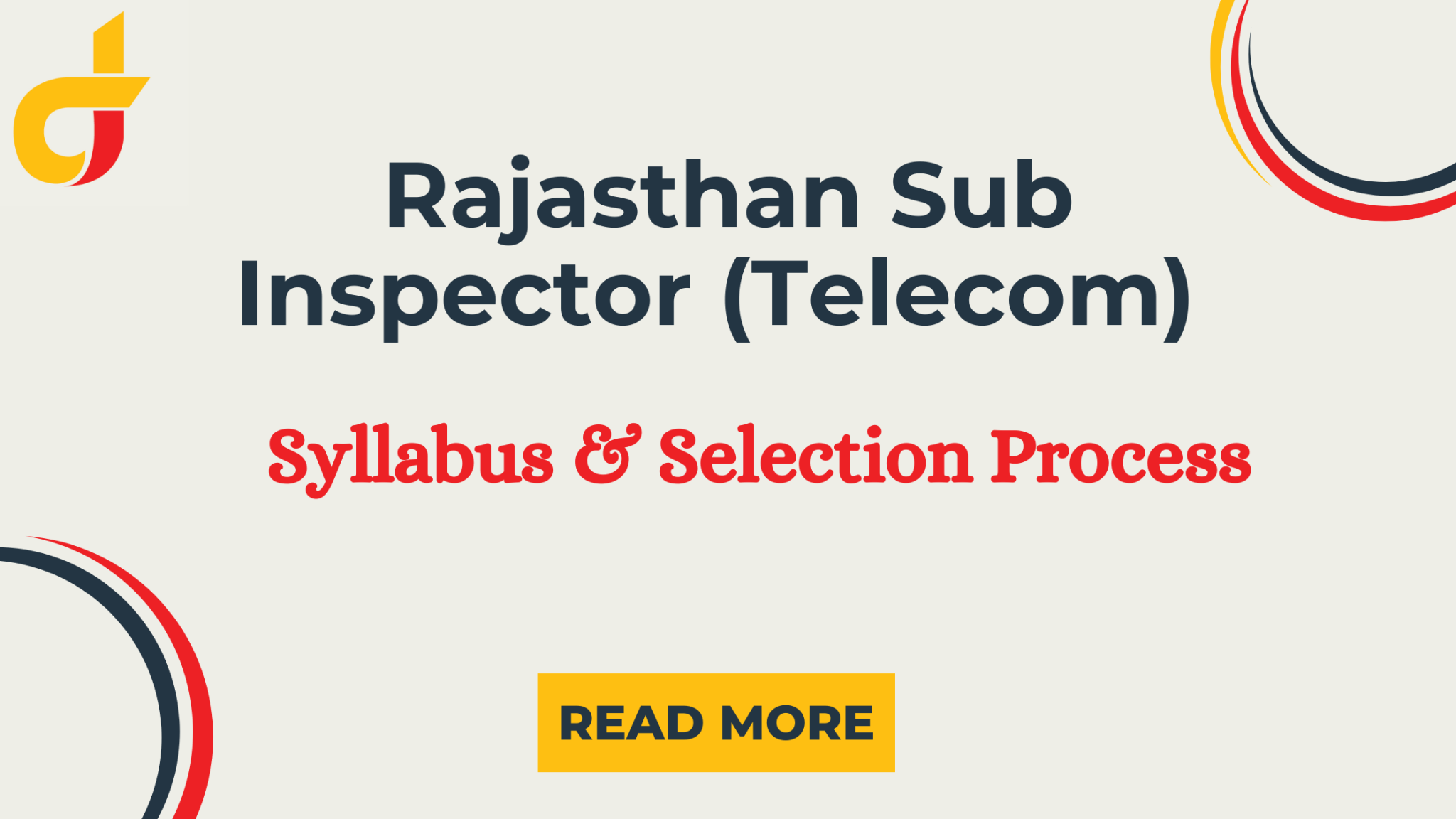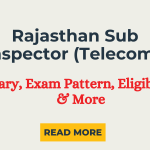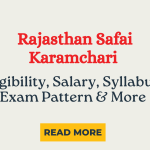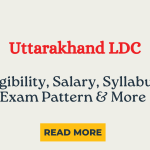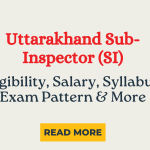Becoming a Sub-Inspector (SI) in Rajasthan is a prestigious position. It is a uniformed job, ideal for those aspiring to serve in a uniformed service. The role of an SI in Rajasthan is challenging and considered to be one of the top-level exams, just below the RAS exam.
The Rajasthan Public Service Commission (RPSC) is organizing a recruitment drive for 98 vacancies for the post of Sub-Inspector (Telecom) in the Police Telecommunication Department.
Rajasthan Sub-Inspector (Telecom) Recruitment 2024
| Detail | Information |
|---|---|
| State | Rajasthan |
| Post Name | Telecom Sub Inspector |
| Organization | Rajasthan Public Service Commission (RPSC) |
| Department | Telecom Department |
| Vacancy | 98 |
| Eligibility Criteria | Graduate degree, Devanagari script proficiency |
| Application Start | July – August 2024 |
| Mode | Offline |
| Official Website | RPSC Official Website |
Rajasthan Sub Inspector (Telecom) Syllabus
Part A – General Knowledge of Rajasthan
Rajasthan History and Art & Culture:
- History: Key historical sites, prominent dynasties, administrative and revenue systems, socio-cultural issues.
- Freedom Movement: Political awakening and integration.
- Architecture: Major features, forts, and monuments.
- Art and Craft: Paintings and handicrafts.
- Literature: Important literary works in Rajasthani literature and local dialects.
- Festivals and Traditions: Fairs, festivals, folk music, and dance.
- Culture and Heritage: Rajasthani culture, traditions, and heritage.
- Religious Movements: Significant religious movements, saints, and local deities.
- Tourism: Important tourist destinations and notable personalities.
Indian History:
- Ancient and Medieval Period:
- Key features and landmarks of ancient and medieval India.
- Art, culture, literature, and architecture.
- Major dynasties, their administrative systems, and socio-economic conditions.
- Significant movements and events.
- Modern Period:
- Important events, personalities, and issues from the mid-18th century to the present.
- Freedom struggle and Indian national movement, including key contributors and their roles.
- Social and religious reform movements of the 19th and 20th centuries.
- Integration and reorganization of the country post-independence.
World Geography:
- General World Geography:
- Physical features, environmental and ecological issues.
- Wildlife, biodiversity, international waterways, and major industrial regions.
Indian Geography:
- General Indian Geography:
- Physical features and major geographical divisions.
- Agriculture, minerals (iron, manganese, coal, oil and gas, atomic minerals), major industries, and transport.
- Environmental issues and ecological concerns.
Rajasthan Geography:
- General Rajasthan Geography:
- Physical features and major geographical divisions.
- Natural resources, climate, vegetation, forests, wildlife, and biodiversity.
- Major irrigation projects, mining, minerals, population, and industrial development.
Part B – General Science
Indian Polity:
- Constitutional Development and Indian Constitution:
- Government Acts of 1919 and 1935, Constitution Assembly, nature of Indian Constitution.
- Preamble, Fundamental Rights, Directive Principles of State Policy, Fundamental Duties, federal structure, constitutional amendments, emergency provisions, Public Interest Litigation (P.I.L.), and judicial review.
- Political System and Governance:
- Nature of the Indian state, democracy in India, state reorganization, coalition governments, political parties, and national integration.
- Union and state executive, legislature, judiciary.
- Key institutions: President, Parliament, Supreme Court, Election Commission, Comptroller and Auditor General, Planning Commission, National Development Council, Central Vigilance Commission (CVC), Central Information Commission, Lokpal, National Human Rights Commission (NHRC).
- Local self-governance and Panchayati Raj.
- Public Policy and Rights:
- National public policy as a welfare state.
- Various legal rights and citizen charters.
Rajasthan Polity:
- State Governance:
- Governor, Chief Minister, State Legislature, High Court, Rajasthan Public Service Commission, District Administration, State Human Rights Commission, Lokayukta, State Election Commission, State Information Commission.
- Public policy, legal rights, and citizen charters.
- Laws and regulations concerning crimes against women and children.
Economic Concepts and Indian Economy:
- Basic Economic Concepts:
- Budget, banking, public finance, national income, fundamentals of growth and development.
- Accounting concepts, tools, and administration.
- Stock exchange and securities market.
- Fiscal and monetary policies, subsidies, public distribution system, e-commerce.
- Inflation: concept, impact, and control mechanisms.
- Economic Development and Planning:
- Five-year plans: Objectives, strategies, and achievements.
- Major economic sectors: Agriculture, industry, services, trade – current status, issues, and initiatives.
- Major economic problems and government initiatives, economic reforms, and liberalization.
- Human Resources and Economic Development:
- Human Development Index (HDI).
- Poverty and unemployment: Concepts, types, causes, remedies, and major schemes.
- Social Justice and Welfare:
- Provisions for marginalized groups.
Rajasthan Economy:
- Overview of the Economy:
- Key issues in agriculture, industry, and service sectors.
- Growth, development, and planning.
- Infrastructure and resources.
- Major development projects.
- Government welfare schemes for various groups: SC/ST, OBC, minorities, disabled persons, orphans, women, children, elderly, farmers, and laborers.
Science and Technology:
- Fundamentals of Everyday Science:
- Basics of electronics, computers, information and communication technology.
- Space technology including satellites.
- Defense technology, nanotechnology.
- Human body, nutrition, healthcare, environmental changes and their effects.
- Biodiversity, biotechnology, genetic engineering, and developments in Rajasthan.
Reasoning:
- Logical Reasoning:
- Deductive, inductive, and analytical reasoning.
- Statements and assumptions, statements and arguments, statements and conclusions, methods of reasoning.
- Analytical reasoning.
- Mental Ability:
- Number series, letter series, odd one out, coding-decoding, relationships, shapes, and related problems.
- Basic Numerical Ability:
- Fundamental knowledge of mathematical and statistical analysis.
- Number system, order of magnitude, ratio and proportion, percentage, simple and compound interest, data analysis (tables, bar graphs, line graphs, pie charts).
Current Affairs:
- General Awareness:
- Major state, national, and international current events and issues.
- Recent news about notable persons and places.
- Sports and related activities.
General Hindi:
- Word Formation:
- Sandhi and its separation, compound words, prefixes, and suffixes.
- Word Types:
- Sanskrit, semi-Sanskrit, derived, indigenous, foreign words.
- Nouns, pronouns, adjectives, verbs, and adverbs.
- Vocabulary:
- Synonyms, antonyms, meaning of word pairs, contextual word selection, relationship words.
- Grammar:
- Sentence structure, punctuation, idioms/proverbs, specialized vocabulary (administrative, legal).
Selection Process of Rajasthan Sub-Inspector (Telecom)
Exam Pattern Rajasthan Sub-Inspector (Telecom)
| Exam Pattern | Paper 1 | Paper 2 |
|---|---|---|
| Subject | Hindi | General Knowledge & General Science |
| Maximum Marks | 200 | 200 |
| Negative Marking | 1/3 mark will be deducted for each wrong answer | 1/3 mark will be deducted for each wrong answer |
| Types of Questions | Objective Type | Objective Type |
| Duration | 2 hours | 2 hours |
| Number of Questions | 100 | 100 |
Written Test
The written test will be an objective type exam to assess knowledge in General Knowledge, General Science, and Hindi. It will carry a weightage of 400 marks.
Qualifying Marks in Written Exam
Candidates who score 36% marks in each paper and 40% marks overall in the competitive exam will be considered to have qualified.
Physical Test
This stage includes a Physical Standard Test and a Physical Efficiency Test. Candidates’ physical parameters like height, weight, etc., will be measured, and their physical efficiency will be assessed. The Physical Efficiency Test will carry 100 marks, and candidates must score at least 50% to qualify. A committee will forward the list of candidates who pass the Physical Efficiency Test to the appointing authority.
Physical Standards for Candidates
- Male Candidates:
- Height: Minimum 168 cm
- Chest: Minimum 81 cm (expanded to 86 cm)
- Garhwali and Gorkha candidates, and those from hilly areas, must have a minimum height of 160 cm.
- Female Candidates:
- Height: Minimum 152 cm
- Weight: Minimum 47.5 kg
- SC/ST candidates with measurements 5 cm less than the specified standards will be considered physically fit.
Race Structure
Male Candidates
| Item | Modified Standard | Marks |
|---|---|---|
| 100 Meter Race | 14 Seconds | 40 |
| 15 Seconds | 25 | |
| 16 Seconds | 15 | |
| More than 16 Seconds | 0 | |
| Long Jump | More than 15 Feet | 40 |
| 14 Feet | 25 | |
| 13 Feet | 15 | |
| Less than 13 Feet | 0 | |
| Chinning Up | 7 Heaves | 30 |
| 6 Heaves | 20 | |
| 5 Heaves | 10 | |
| Less than 5 Heaves | 0 |
Female Candidates
| Item | Modified Standard | Marks |
|---|---|---|
| 100 Meter Race | 17 Seconds | 40 |
| 18 Seconds | 25 | |
| 19 Seconds | 15 | |
| More than 19 Seconds | 0 | |
| Long Jump | More than 10 Feet | 30 |
| 9 Feet | 20 | |
| 8 Feet | 10 | |
| Less than 8 Feet | 0 | |
| Putting in Shot | 16 Feet | 30 |
| (Wt. 4 kg) | 15 Feet | 20 |
| 14 Feet | 10 | |
| Less than 14 Feet | 0 |
Interview
The interview is the final stage of the RPSC Sub Inspector (Telecom) selection process.
- Candidates who pass the written exam and physical efficiency test as per Rule 28 (2) will be eligible for the Aptitude Test and Interview.
- The number of candidates called for the Aptitude Test and Interview will be limited to three times the number of vacancies, based on the total marks obtained in the written exam.
- The Aptitude Test and Interview will carry 50 marks.
- The commission will assess each candidate’s character, personality, intelligence, aptitude for the post, integrity, vigilance, decision-making ability, leadership skills, physical fitness, and knowledge of Rajasthani culture during the interview.
- Additional marks will be awarded for higher qualifications/technical qualifications/participation in national/international sports.
How to Prepare for Rajasthan Sub Inspector (Telecom) Using the Dhurina App
The Dhurina app offers live coaching specifically designed to help candidates prepare for the Rajasthan Sub Inspector (Telecom) exam. Here’s how the Dhurina app can assist in your preparation:
- Top Online Coaching Course: The Dhurina app provides one of the best online coaching courses for Rajasthan Sub Inspector (Telecom) preparation.
- Expert Faculty: Live classes will be conducted by experienced faculty members who will systematically cover the entire syllabus, sharing valuable tips and techniques.
- Comprehensive Resources: The course includes reliable practice materials, study resources, and mock tests to help you excel in the exam.
- Convenient Learning: You can prepare effectively from home with expert guidance.
- BUY EXCLUSIVE SI COUSE BY SUBHASH CHRAN SIR
Click here to BUY EXCLUSIVE SI COUSE BY SUBHASH CHRAN SIR
Steps to Get Started with the Dhurina App:
- Install the App: Go to the Play Store and install the Dhurina App.
- Register: Open the app, enter your name, mobile number, and email to register.
- Login: Generate an OTP using your mobile number, click and you will be logged in.
Conclusion:
We hope this article is helpful and informative. If you have any doubts, feel free to ask in the comments. Download the Dhurina App for information on all government exams and strengthen your preparation.


